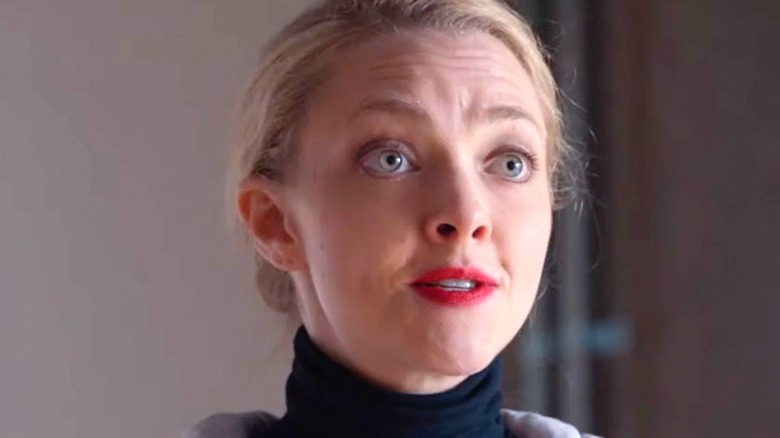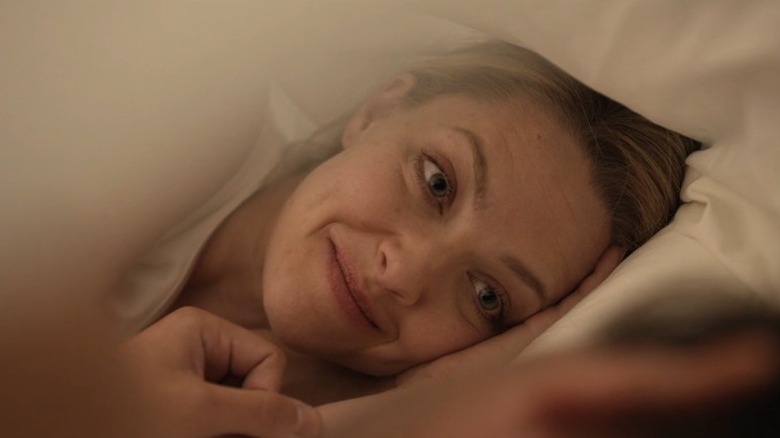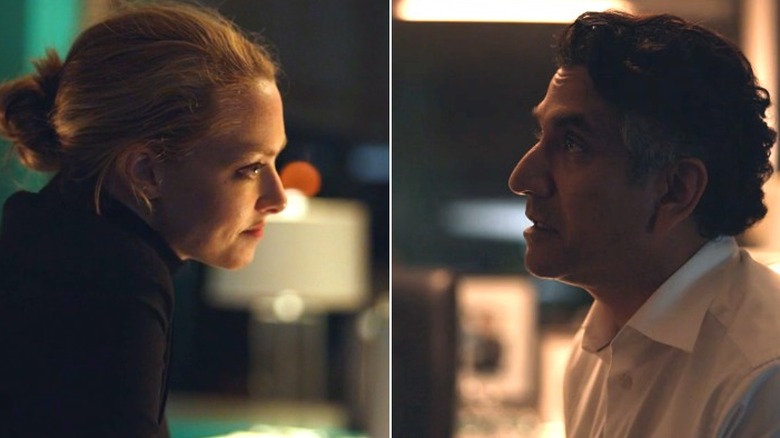The Ending Of The Dropout Explained
No Silicon Valley scandal has sparked quite as much interest — nor birthed quite as many spins, documentaries, and series — as that of the rise and fall of "unicorn" up-start Theranos and its founder, Elizabeth Holmes. To-date, a whopping six different productions (including one starring Jennifer Lawrence) have been made in an attempt to shed new light on the story, to say nothing of the many podcasts and books Theranos has inspired (via Town and Country).
For those unfamiliar with the true crime morality play, it goes something like this: At the age of nineteen, Holmes dropped out of Stanford to found a company she believed would revolutionize the health care industry by making blood tests testing easier, more affordable, and more accessible. Nearly twenty years later, as CNN reports, Holmes was found guilty of four out of eleven charges of fraud, after being charged in 2018 with engaging (alongside partner Ramesh "Sunny" Balwani), in what the SEC called a "years-long fraud in which [Holmes and Balwani] exaggerated or made false statements about the company's technology, business, and financial performance."
But a lot happened in those twenty years, and it's the long and winding narrative of the Theranos story — as well its inextricability from the story of its founder — that has made it irresistible to audiences, writers, and directors, including Elizabeth Meriwether and Michael Showalter. In the ending of their Hulu miniseries, "The Dropout," Showalter and Meriwether investigate this fascination, and come to a conclusion that attempts, at least, to reach some level of self-awareness.
The Dropout finale plays on viewers' sympathies, but only to a point
In creating and directing "The Dropout," Meriwether (of "New Girl") and Showalter (of "The Eyes of Tammy Faye" and the upcoming "Wayland") faced the fundamental problem all biopics face. That is, the difficulty with (and near impossibility of), condensing the incomplete, messy, and complex narrative of an actual life and flesh-and-blood human into a story and character with a beginning, middle, and end. Regardless of how accurately a creator chooses to present the "on paper" facts of a given story, the act of transforming it into a digestible piece of entertainment is, inevitably, both reductive and inaccurate. In an effort to avoid the kind of one-dimensional vilification of their main subject, Meriwether and Showalter spend the majority of their 8-episode mini-series asking audiences to semi-sympathize with Holmes (Amanda Seyfried).
We see, for example, her mother telling her to ignore and compartmentalize a sexual assault in college. We see her father pressure her to "get back to work" when it's clear she needs to rest and mourn. We even see how she was "inspired" to direct her focus not on developing the technology she claimed to have, but on getting the money needed in order to continue to develop it. The catch-22 of Silicon Valley — that is, that in order to develop technology, one needs investors, but those investors are unlikely to take a company seriously unless it already has said technology — is presented in-full, making it easier to understand what kick-started Holmes' unethical spiral.
Still, the series is firm in its condemnation of some of Holmes' more appalling actions (e.g., testing faulty technology on actual cancer patients) and nowhere is this made clearer than in its finale.
Meriwether and Showalter use a tense scene to call-out viewers
In one of Episode 8's more disturbing scenes, Amanda Seyfried's Holmes begins to threaten Naveen Andrews' Balwani, but in a language so-heavily couched in what her longtime boyfriend has difficulty distinguishing from "love" that she presents (and not for the first time) as a textbook sociopath. Rather than threaten her partner outright, Holmes hints at how the story will play out if he betrays her, deliberately feigning an ignorance of his actions and reminding him that she was "barely eighteen" when their relationship first began. What's worse, she ends her steady, ominous threat on a note of emotional and physical affection. And yet, Holmes didn't get to this place without provocation. The scene begins with Balwani alluding to the importance of going through old emails and texts — a not-so-veiled threat in and of itself.
For most of the scene, the audience is forced to alternate between their repulsion of each character's behavior. At times, the much older and ostensibly still in love Balwani presents as an almost sympathetic character. Nevertheless, the scene ends with Balwani asking Holmes where she plans to live, given that he owns their house. The unnervingly tense push-and-pull of the scene is a kind of synecdoche for the very same tension and confusion that makes the story as a whole so compelling. The audience is unable to look away from the dramatic and frightening decline of the pair's previously loving dynamic, just as readers and audiences have been unable to look away from the dramatic public decline of both Theranos and Holmes herself. This investigation and calling out of our own voyeuristic compulsions is something Showalter will continue to lean on throughout the mini-series' finale.
The finale of The Dropout contains a subtle twist
It's no accident that both Balwani and Holmes' new boyfriend, Billy Evans (Garrett Coffey), refer to her as "not real," "faking," or "a liar." Balwani means this seriously ("I invented you inside my head," he tells her at one point), while Evans is joking with her about feigning being asleep. It's also no accident that a cardboard mask of Holmes' own face is among the various personal items we see her packing as she leaves Balwani, that her former partner refers to her as "a ghost," or that the finale is titled "Lizzy," a reference to Holmes' shiny new nickname.
There are simply too many versions of Holmes (or of any human) for her story to be "true" — a point illustrated both by the party full of Elizabeth Holmes masks and her switch-flip from animalistic scream to polite Uber greeting in the final scene. By repeatedly coming back to the illusiveness of Holmes' identity, Meriwether and Showalter's ending openly recognizing the limitations of dramatization fueled by voyeurism. Importantly, this isn't something the series lets slip until the very end, and the series turning in on itself at the last minute "tricks" viewers in the same way Holmes tricked investors, patients, and retailers for years.
Eilzabeth Holmes, as we know her and as various outlets have depicted her, isn't real. Since the story of the woman and the woman herself are, by definition, two different things, the woman we think we know does not, strictly speaking, actually exist. The story itself, the ending tells us, is a fraud — one that our enthusiastic investment helped perpetrate.



